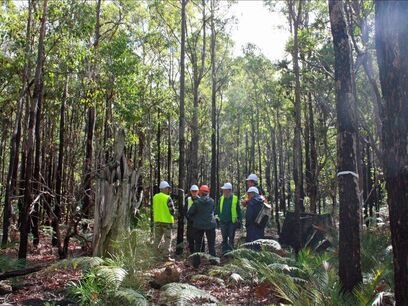
Ecological Thinning for Forest Health
The Djarlma Plan for the Western Australian Forestry Industry - A Framework for action 2019-2023 (The Djarlma Plan) notes
'A combination of climate change, bushfires and a legacy of past forest and fire management practices has created a challenging situation for Jarrah-marri forests and their associated surface and groundwater systems. Recent studies indicate that some of the forests of the South West region are already experiencing acute water stress because of falling groundwater tables.'
-
One of the Djarlma Plan's outcomes is to have healthy forests and woodlands underpin the future of the Western Australian forestry industry. To meet this outcome, it is suggested to undertake ecological thinning and smaller trees in imbalanced jarrah-marri regrowth forests, as required by the Forest Management Plan and use operational trials to demonstrate improved forest health and resilience. The Ecological Thinning for Forest Health Working Group was formed in September 2019. Its members drawn from community members, Department of Biodiversity, Conservation and Attractions, Forest Products Commission, Department of Fire and Emergency Services and Industry with support from the South West Timber Hub.
The working group then identified a 10 member community member to form a reference panel to assist in the trials.
The links provide relevant presentations, resources, background material and administration documents for Ecological Thinning for Forest Health program.
If you have any questions please contact us
Wendy Perdon w.perdon@swtimberhub.com.au
or call 0448 594 086.
Presentations
Climate change impacts on forest health, Katinka Ruthrof
Background material
Spatial configuration of drought disturbance and forest gap creation across environmental gradients, Andrew et al.
Landscape-scale assessment of tree crown dieback following extreme drought and heat in a Mediterranean eucalypt forest ecosystem, Brouwers et al.
Sudden forest canopy collapse corresponding with extreme drought and heat in a mediterranean-type eucalypt forest in southwestern Australia, Matusick et al.
Subcontinental heat wave triggers terrestrial and marine, multi-taxa responses, Ruthrof et al.
Eucalyptus forest shows low structural resistance and resilience to climate change-type drought, Matusick et al.
Combating ecosystem collapse from the tropics to the Antartic, Bergstrom et al.
Underappreciated plant vulnerabilities to heat waves, Breshears et al.
Some like it hot: Drought-induced forest die-off influences reptile assemblages, Dundas et al.
Administration
Treatment costs for Ecological Thinning for Forest Health site, Munro
Community Reference Panel for the Forest Thinning for Ecological Health program
Forest Thinning for Ecological Health Working Group terms of reference
Community Reference Panel claim form

